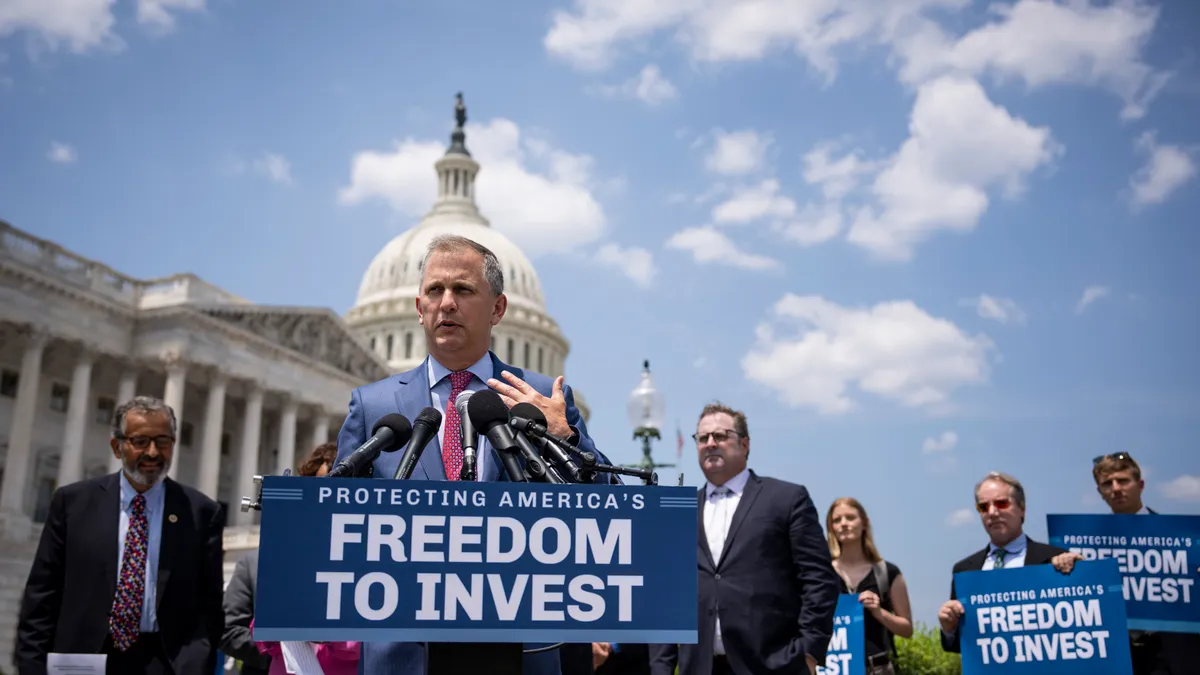Dive Brief:
- A group of 21 Congressional Democrats sent a letter to the Securities and Exchange Commission Chair Gary Gensler Monday, asking the agency to finalize its ESG disclosures rule designed to combat greenwashing in ESG, or similarly labeled funds.
- The letter, signed by four senators and 17 congressional representatives, said finalizing the ESG disclosures rule “is critical for addressing greenwashing and other exaggerated or unfounded ESG-related claims amongst funds and investment advisers.”
- The lawmakers said they were “encouraged” by the SEC’s finalization of its climate-risk disclosure rule and asked the agency to retain certain components of the initial ESG disclosure proposal. They said finalizing the regulation would complement the amendments the SEC made to the Investment Company Act’s Names Rule in September.
Dive Insight:
The letter comes the same week European Union regulators finalized their own rules on the criteria necessary to label products as ESG funds within the bloc. The European Securities and Markets Authority said Tuesday that funds with ESG in their name must have at least 80% of its investments used to meet environmental, social or sustainability objectives. The rule is analogous to the SEC’s Names Rule, which also requires funds with objectives or goals in their names to invest 80% of the fund on aligned-objectives.
Thomas Kuh, Morningstar Indexes’ head of ESG strategy, told ESG Dive that the sustainable investment market is at a stage of development and maturation where “rules, definitions, standards [and] regulations are in order.” Kuh said he believes the rules the SEC is proposing will begin to assuage investor concerns that have arisen from the politicization of ESG and sustainable investing.
“This segment of the industry has evolved organically … but it's really reached both a level of interest on the part of investors, and also a scale in terms of the assets under management that really warrants regulation,” Kuh said in an interview. “Having said that, regulation is often a kind of a double-edged sword … it really needs to be done carefully.”
The lawmakers urged the SEC to finalize the “Enhanced Disclosures by Certain Investment Advisers and Investment Companies about Environmental, Social, and Governance Investment Practices” regulation it proposed in May 2022. The letter was led by Democratic Sens. Brian Schatz and Tina Smith, of Hawaii and Minnesota, respectively, and Reps. Sean Casten and Juan Vargas, of Illinois and California.
The lawmakers asked the agency to maintain specific elements of the proposal in its anti-greenwashing effort, including requiring engagement and proxy voting disclosures for certain funds; requiring that funds with ESG language in the names use ESG factors as a “significant or main consideration;” and requiring certain ESG funds that consider environmental factors to disclose greenhouse gas emissions metrics in the portfolio.
“Funds and investment advisers are not currently required to substantiate their ESG strategies and practices through disclosures, which creates opportunities for greenwashing and other exaggerated or unfounded claims,” the letter said. “Investors need disclosures to know whether the ESG-branded and marketed services and investment products align with their investment needs, preferences, and expectations.”
Sens. Elizabeth Warren and Sheldon Whitehouse also signed the letter, and were joined by Reps. Eleanor Holmes Norton, Summer Lee, Katie Porter, Delia Ramirez, Barbara Lee, Jan Schakowsky, Jared Huffman, Ro Khanna, Rashida Tlaib, Kevin Mullin, Sydney Kamlager-Dove, Melanie Stansbury, Nydia Velázquez, Nikema Williams and Alma Adams.
The final rule was expected to be released in April, according to the regulatory agenda the Biden Administration released in December. The agency said in its proposal that the rule was necessary because “investors looking to participate in ESG investing face a lack of consistent, comparable, and reliable information among investment products and advisers that claim to consider one or more ESG factors.”
“While the Commission has not generally prescribed specific disclosures for particular investment strategies, ESG strategies differ in certain respects that we believe necessitate specific requirements and mandatory content to assist investors in understanding the fundamental characteristics of an ESG fund or an adviser’s ESG strategy in order to make a more informed investment decision,” the proposal said.












